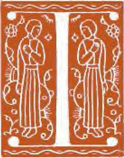 OF THE MANNER OF DISTRIBUTING OUR BOOKS TO ALL STUDENTS
OF THE MANNER OF DISTRIBUTING OUR BOOKS TO ALL STUDENTS OF THE MANNER OF DISTRIBUTING OUR BOOKS TO ALL STUDENTS
OF THE MANNER OF DISTRIBUTING OUR BOOKS TO ALL STUDENTS
 T hath always been difficult so to limit men by the laws of honesty that the knavery of a succeeding generation should not strive to overleap the limits set by a preceding one and break established rules through wanton insolence. Accordingly, following the advice of prudent men, we have devised beforehand a fixed plan according to which it is our will that the communication and use of our books shall be allowed for the advantage of students.
T hath always been difficult so to limit men by the laws of honesty that the knavery of a succeeding generation should not strive to overleap the limits set by a preceding one and break established rules through wanton insolence. Accordingly, following the advice of prudent men, we have devised beforehand a fixed plan according to which it is our will that the communication and use of our books shall be allowed for the advantage of students.
First, then, we give and grant our books one and all, of which we have made a special catalogue, in consideration of affection, to the company of scholars dwelling in N. Hall in Oxford, as a perpetual alms-deed for our own soul and for the souls of our parents, as well as for the souls of the most illustrious King of England, Edward, the Third since the Conquest, and his consort, the most devout lady, Queen Philippa, that the said books may be lent out for a time to one and all the scholars and masters of the University of the said city, both regulars and seculars, for their advantage and use in study, according to the manner here subjoined, which is as follows:
Five of the scholars dwelling in the aforesaid Hall are to be appointed by the master of that Hall and to them the keeping of all the books is to be deputed. Of these five, three, and in no case fewer, shall have power to lend out a book or books solely for inspection and use in study; but for copying and transcribing we allow no book to pass beyond the walls of the house. Therefore, when any scholar secular or religious, whom we reckon as on equal footing in our present favour, shall ask for the loan of any book, let the keepers carefully consider whether they have the book in duplicate. If so, let them lend him the book, after taking a security whose value in their judgment is greater than that of the book lent, and make out at once a written entry concerning the security and the book lent, with the names of those who have delivered the book and of him who has received it, together with the day and the year of our Lord when the loan was made. But if the keepers find that the book required is not in duplicate, let them in no wise lend that book to any one out of the company of scholars of the said Hall, except it be for inspection within the walls of the house or Hall aforesaid, but not for removal beyond them. But any book may be loaned by three of the aforesaid keepers to any scholar of the said Hall; his name and the day in which he receives the book being first noted down. He may not, however, lend to another the book that has been delivered to him, except on leave of three of the above-mentioned keepers, and then let the name of the first borrower be erased and the name of the second, with the time of delivery, written in its place.
All the keepers shall bind themselves to observe all these rules when the custody of the books is committed to them, and those who receive a book or books shall swear in like manner that they will use the books for no other purpose than inspection and study, and will neither take them nor suffer them to be taken beyond the city of Oxford with its suburbs.
Once a year, moreover, the above-mentioned keepers shall render an account to the master of the house and to two of the scholars to be selected by him, or if he has not leisure, let him appoint three inspectors, other than the keepers, to read through the catalogue of the books and see that they have them all, either in the volumes themselves or at least in the securities that are at hand. For taking this account we think a suitable time to be between the first of June and the subsequent feast of the translation of the glorious martyr Saint Thomas.
But this we must add, that each and every one who has been loaned a book shall bring it once in the year to the keepers and, if he like, see his security. Furthermore, if any book should happen to be lost through death, theft, fraud, or carelessness, let him who has lost it, or his administrator or executor, pay the price of the book and receive the security; but if profit should in any way accrue to the keepers themselves, it is to be devoted to none other purpose than the repair and maintenance of books.